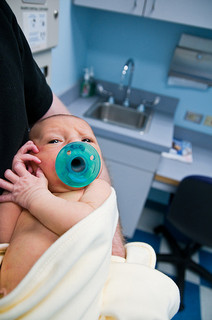February 8, 2013 -- Kaleb Lahr was born on his due date in August 2010 at Three Rivers Hospital in Grants Pass. He appeared healthy at first, but his grandmother noticed he wasn’t breathing quite right.

His mother, Lindsey Lahr, decided to have a nurse check his vital signs before she laid down to rest. They were due to return home that morning.
At first, the nurse thought something was wrong with the machine. She could get no oxygen reading in the baby’s arms or legs. But the machine was accurate.
“He wasn’t receiving oxygen from the neck down,” Lahr said. “Had I taken that sleeping pill and gone to sleep, he would have died.”
Kaleb was one of 300 Oregon babies born each year with a congenital heart disease. Thirty percent of babies leave the hospital with their condition undetected. Half of those babies then die within two weeks.
Oregon, unlike eight states, including California, does not require hospitals to screen for critical congenital heart disease before the babies leave the hospital.
Critical congenital heart disease often shows no obvious symptoms, but it can be caught with a simple, noninvasive test called pulse oximetry, which tests the percentage of hemoglobin that is saturated with oxygen.
Bipartisan legislation has been introduced in the House that will put Oregon on that short list of states that require any healthcare facility that delivers babies to perform the pulse oximetry test on each baby before release. The House Health Care Committee heard from Lahr and others testifying on behalf of screening on Friday.
“We want to do this so no other families have to go through with this,” Lahr said.
Because oxygen was still going to his head, his brain was saved, but Kaleb had massive damage to his heart. He has undergone two major heart surgeries and his heart will need to be replaced. The nurse caught his condition 14 hours after he was born, saving his life. But if he had been screened more quickly after birth, much of the damage may have been prevented.
Pat Scheans, a neonatal nurse practitioner at Legacy Emanuel Hospital in Portland, said Legacy has already started screening every newborn, as have 60 percent of Oregon hospitals, according to the Oregon Health Authority. “We had one baby who would have gone home,” Scheans said. “The baby went to heart surgery and went home breast-feeding” a few days later.
Stephanie Tama-Sweet of the American Heart Association said the test costs only $5 to $10 per infant. The screening could not only save lives, but the cost of healthcare for those children whose condition is not caught right away is much higher.
Dr. Jim Lace of the Oregon Pediatric Society said babies sometimes are in and out of the hospital in 24 hours and said it was important that this simple check of the baby’s vitals be done immediately. “It’s a very easy test,” Lace said. “Nurses have been doing it all along.”
House Bill 2693 has the support of Republican Rep. Jim Thompson of Dallas along with Democratic Reps. Mitch Greenlick and Alissa Keny-Guyer of Portland. The bill is also being pushed by the March of Dimes.
Gov. Kitzhaber, who has made improved prenatal care a chief focus of his Oregon Health Plan transformation, declared the second week of February to be Congenital Heart Defect Awareness Week.
Image by NoVa Hokie (CC BY-NC-ND 2.0) via Flickr.